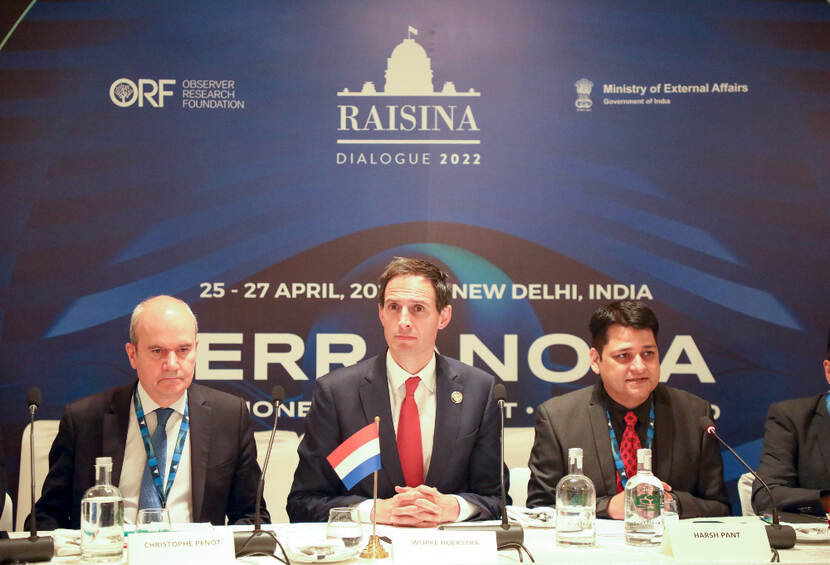Speech by Minister Hoekstra at the Law of the Sea event, India
Opening speech by Minister Wopke Hoekstra of Foreign Affairs, at the Law of the Sea roundtable event in India, 26 April 2022.
Thank you, professor Pant, for your warm introduction.
This is my first time at the Raisina dialogue, and it’s a privilege to exchange views with academics, diplomatic colleagues, and professional analysts at this important geopolitical forum.
You, the participants of this roundtable, fall in all three of these categories – so I trust you will have a fascinating discussion.
I’m also a bit humbled. Being here with you – a room full of experts – to speak about a subject you know far more about. So I won’t take too long, and will leave the expert opinions to you.
Let me just say that I’m glad the Observer Research Foundation could put this roundtable together. I’m happy that the Netherlands could contribute to this. So thank you, Alex Oude Elferink, director of the Netherlands Institute for the Law of the Sea – and all your international colleagues – for your hard work.
As you all know, this side event is about the UNCLOS, the 1982 United Nations Convention on the Law of the Sea. It’s a crucial Convention. As you may know, the oceans cover 70 per cent of the earth’s surface. Fewer people are aware that, according to the OECD, around 90 per cent of all traded goods are carried over sea. The oceans are the most important transport routes we have: they are the arteries of the global economy. And they are becoming more important every day. The OECD expects maritime trade volumes will triple between now and 2050.
It’s essential that this vast flow of traffic is guided by a clear and widely accepted legal structure. Fortunately, UNCLOS offers exactly this: a legal framework for all activities at sea.
With trade volumes tripling, UNCLOS will only grow more important in the coming decades. We are all familiar with the challenges of the international maritime order: delimitations of maritime zones, keeping trade routes safe, and the effects of climate change.
The international community has an enormous incentive to work together, and uphold the integrity of the Convention. The Netherlands will continue to work towards that goal, together with all partners.
Because the freedom to use the oceans and high seas comes with a heavy responsibility. The duty to settle disputes peacefully, and to keep the seas open. UNCLOS offers a number of excellent ways to do this. For instance through diplomatic instruments like negotiations, mediation, conciliation or arbitration. But also through recourse to legal steps, such as the International Court of Justice, the Permanent Court of Arbitration, or the International Tribunal for the Law of the Sea.
The Netherlands has two longstanding traditions in its history. First, for as long as we’ve existed, we’ve been a seafaring nation. For hundreds of years, our ships have docked at every major port around the world. Second, we also believe in international law and justice. The Hague is home to more international courts and tribunals than any other city. And Hugo de Groot, one of the leading lights of the 17th century and intellectual architect of ‘Mare Liberum’, is one of our most famous sons.
So today, in the spirit of these two traditions, I want to stress how crucial it is that international law is upheld. And that every country continues to choose the path of peaceful settlement.
That’s why I’m pleased with the organization of this round table. This is a timely and worthwhile discussion, in a time in which we are facing broader geopolitical challenges to protect the rules based international order. The Netherlands – and the EU – want to join hands with India and other partners in the Indo-Pacific region to protect the integrity of UNCLOS and strengthen the rules based international order. That is part of our broader Indo-Pacific strategy which I am here to discuss with my Indian counterpart minister Jaishankar later today.
In today’s discussion you will focus on the important question how UNCLOS can respond to new maritime challenges. I wish you wisdom and an inspiring round table!
